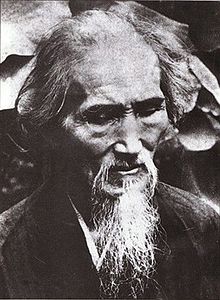Hsu Yun
| Hsu Yun | |
|---|---|
| 虛雲 | |
 |
|
| Religion | Chan Buddhism |
| School | Chan Buddhism |
| Personal | |
| Nationality | Chinese |
| Born | 26 August 1840 (claimed) Fujian, Qing China |
| Died | October 13, 1959 (aged 119) (claimed) |
| Senior posting | |
| Title | Chan master |
| Religious career | |
| Teacher | Yung Ching |
| Students | Fo Yuan, Jy Ding, Jing Hui, Hsuan Hua |
| Hsu Yun | |||||||||||||||||||||||
| Traditional Chinese | 虛雲 | ||||||||||||||||||||||
|---|---|---|---|---|---|---|---|---|---|---|---|---|---|---|---|---|---|---|---|---|---|---|---|
| Simplified Chinese | 虚云 | ||||||||||||||||||||||
|
|||||||||||||||||||||||
| Birth name | |||||||||||||||||||||||
| Traditional Chinese | 蕭古巖 | ||||||||||||||||||||||
| Simplified Chinese | 萧古岩 | ||||||||||||||||||||||
|
|||||||||||||||||||||||
| Transcriptions | |
|---|---|
| Standard Mandarin | |
| Hanyu Pinyin | Xūyún |
| Wade–Giles | Hsǖ Yǘn |
| Yale Romanization | Syūyún |
| Yue: Cantonese | |
| Yale Romanization | Heuīwàhn |
| Jyutping | Heoi1wan4 |
| Southern Min | |
| Hokkien POJ | Hu-Ûn |
| Tâi-lô | Hu7hun7 |
| Transcriptions | |
|---|---|
| Standard Mandarin | |
| Hanyu Pinyin | Xiāo Gǔyán |
| Wade–Giles | Hsiāo Kǔyén |
| Yale Romanization | Syāu Gǔyán |
| Yue: Cantonese | |
| Yale Romanization | Sīu Gúngàahm |
| Jyutping | Siu1 Gu2ngaam4 |
| Southern Min | |
| Hokkien POJ | Siau Kó͘-gâm |
Hsu Yun (Chinese: 虚云; pinyin: Xūyún; born Xiao Guyan Chinese: 萧古巖; 26 August 1840 (claimed)– 13 October 1959) was a renowned Chinese-born Chan Buddhist master and one of the most influential Buddhist teachers of the 19th and 20th centuries.
Hsu Yun was born on August 26 in Fujian, Qing China. His mother died during childbirth. In the 30th year of the reign of the Daoguang Emperor (1850), when he was eleven years old, his father returned to Quanzhou. The aging grandmother of the Chou clan was determined that her grandson would have a wife. In order to continue both his and his uncle's lineage, Hsu Yun was to marry one woman from the Tian family and one from the Tan family.
His first exposure to Buddhism was during the funeral of his grandmother. Soon afterward he began reading Buddhist sutras and later made a pilgrimage to Mount Heng, one of the most important Buddhist sites in China.
When he was fourteen years old, he announced that he wished to renounce the material world in favour of monastic life. His father did not approve of Buddhism and had him instructed in Taoism instead. From the start, Hsu Yun was dissatisfied with Taoism, which he felt could not reach the deeper truths of existence. The storerooms of his house were full of very old books. Going through them, he found a volume called the 'Story of Incense Mountain', which described the life of Guanyin. After reading the book, he was deeply influenced and was aspired to go forth from the home to monkhood to practice Buddhism.
When Hsu Yun was seventeen, he had already undergone the hardship of practicing Taoism for three years and was indeed disappointed. He constantly thought about leaving the home-life and joining the Sangha. One day in his uncle's absence he attempted to flee to Mount Heng to shave his head and officially leave the home-life. Little did he know that on a winding mountain path he would encounter envoys sent by his uncle to intercept and escort him back. His aspiration was not realized and he was reproved and brought back home. When Hsu Yun arrived home, the family feared that he would escape again, so he was sent with his first cousin, Fu Kuo, to Quanzhou. His father formally received the brides from the Tian and Tan families for Hsu Yun, and his marriage was completed. Hsu Yun, however, had already realized the emptiness of form. He held no view of a self or of others and had not the slightest thought of desire. He was clear of mind and pure in body. Therefore, although they dwelt together, he remained undefiled. Moreover, he extensively explained the dharma to the women so that they too would practice Buddhism.
...
Wikipedia
